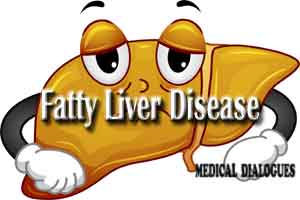- Home
- Editorial
- News
- Practice Guidelines
- Anesthesiology Guidelines
- Cancer Guidelines
- Cardiac Sciences Guidelines
- Critical Care Guidelines
- Dentistry Guidelines
- Dermatology Guidelines
- Diabetes and Endo Guidelines
- Diagnostics Guidelines
- ENT Guidelines
- Featured Practice Guidelines
- Gastroenterology Guidelines
- Geriatrics Guidelines
- Medicine Guidelines
- Nephrology Guidelines
- Neurosciences Guidelines
- Obs and Gynae Guidelines
- Ophthalmology Guidelines
- Orthopaedics Guidelines
- Paediatrics Guidelines
- Psychiatry Guidelines
- Pulmonology Guidelines
- Radiology Guidelines
- Surgery Guidelines
- Urology Guidelines
Fasting May Help Fight Fatty Liver Disease

Scientists have found that upon deprivation of food a certain protein is produced that adjusts the metabolism in the liver, assisting in warding off fatty liver disease.
According to researchers, a reduced intake of calories, such as in the framework of an intermittent fasting diet, can help to whip the metabolism back into shape.
The findings showed that during fasting, the stress molecule reduces the absorption of fatty acids in the liver and improves sugar metabolism.
In the study, published in the open access journal EMBO Molecular Medicine, the researchers found that during fasting GADD45 beta protein, whose name stands for 'Growth Arrest and DNA Damage-inducible' controls the absorption of fatty acids in the liver.
Mice who lacked the corresponding gene were more likely to develop fatty liver disease.
However when the protein was restored, the fat content of the liver normalised and also sugar metabolism improved.
Also, in humans, a low GADD45 beta level was accompanied by increased fat accumulation in the liver and an elevated blood sugar level.

Disclaimer: This site is primarily intended for healthcare professionals. Any content/information on this website does not replace the advice of medical and/or health professionals and should not be construed as medical/diagnostic advice/endorsement or prescription. Use of this site is subject to our terms of use, privacy policy, advertisement policy. © 2020 Minerva Medical Treatment Pvt Ltd